How To Breath Easy: 7 Herbs For Lung Health

Breathe in, breathe out. You might not give it much thought, but breathing is the reason you’re alive. Without oxygen, your body cannot survive.
Your lungs not only take in oxygen and release carbon dioxide, but they also protect your other organs from irritants, harmful organisms, and a host of environmental pollutants. This usually goes on without a thought, yet for many people, breathing can be a struggle.
According to the American Lung Association, more than 33 million Americans deal with a chronic lung disease, including asthma, lung cancer, chronic obstructive pulmonary disease (COPD), and pulmonary fibrosis. (1)
Whether you have a chronic condition or you’re dealing with temporary chest congestion, there are natural remedies that can help you. Read on to discover some of the best herbs and natural supplements that can improve lung health along with some tips to maintain overall well-being for your respiratory system.
7 Herbs For Lung Health
While there are many herbal remedies that promise lung health, you should always seek the medical advice of your health care professional before taking any new supplement.
Below are some natural remedies—backed by scientific evidence—that may help improve respiratory health.
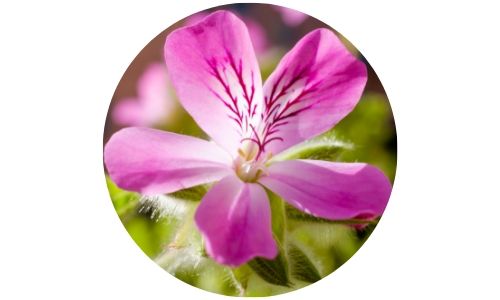
1. Pelargonium
Also known as African geranium or umcka in your local health food store, pelargonium is a potent herb loaded with antimicrobial and antiviral properties that help immune system cells. (2)
Research has shown that pelargonium can alleviate respiratory tract infections such as acute bronchitis, sinusitis, or sore throat. (3)
In fact, multiple studies show that pelargonium not only alleviates bronchitis and works as an expectorant to clear excess mucus, but it can do so more effectively than prescribed antibiotics. (4) You can find pelargonium as a liquid extract, cough syrup, or in capsules, tablets, and chewable supplements.

2. Curcumin
A natural polyphenol that gives turmeric its bright orange-yellow color, curcumin has been shown to be a powerful player in lung health. A 2014 study found that curcumin worked as an anti-inflammatory agent that reduced airway inflammation of mice with asthma (5) while a 2017 study demonstrated that curcumin inhibited the development of non-small cell lung cancer. (6)
While more clinical trials are needed, findings over the past decades are promising. A surefire way to get curcumin is to eat turmeric either as a spice in your food or in beverages—golden milk, anyone?
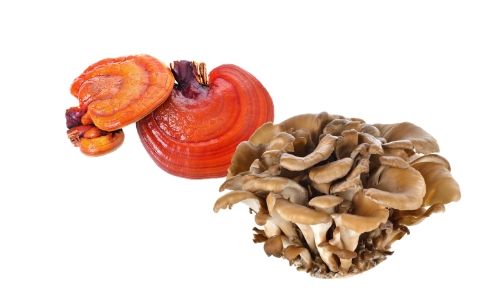
3. Medicinal Mushrooms
In addition to being food, many mushrooms are also used as medicine. These are called medicinal mushrooms. For over three decades, medicinal mushrooms have been federally approved to use alongside standard cancer treatments in Japan and China.
Among the more potent and well-researched mushrooms are turkey tail, reishi, shiitake, and maitake. (7) Like most mushrooms, these edible fungi are full of powerful antioxidants and beta-glucans that fight damaging free radicals as well as polysaccharides that can fight various cancers, including lung cancer.
According to a 2019 report, the best known active compound in turkey tail mushroom—polysaccharide K, or PSK—helped lung cancer patients live longer than those who did not take it. (7) Other studies using reishi also found that its polysaccharides helped strengthen the immune system in patients with lung cancer. (8)
You can get most medicinal mushrooms in raw food form, powdered extracts, capsules, or in drinks like tea and kombucha.
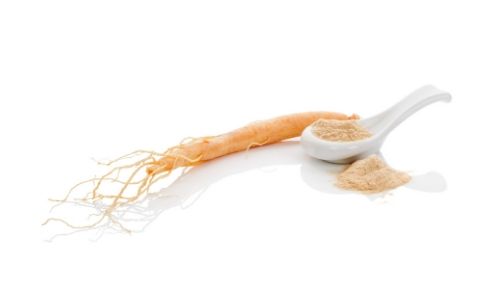
4. Ginseng
There are two different types of ginseng—one is Panax ginseng (Asian ginseng or Korean ginseng ) and the other is American ginseng (Panax quinquefolius). While both of these natural nootropics have been used for centuries to help everything from energy levels to dry cough, each has its own unique health benefits.
American ginseng has been shown to reduce mental fatigue and significantly improve cognitive function (9), while the active compounds in Korean red ginseng (called ginsenosides) have been shown to decrease lung inflammatory responses (10) and inhibit symptoms of chronic obstructive pulmonary disease, aka COPD. (11) You can readily find ginseng in raw form, capsules, or liquid and powdered extracts.
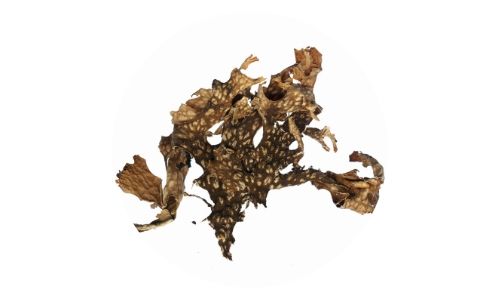
5. Lungwort
Named after its white-spotted green leaves that were thought to resemble lung tissue, lungwort (aka pulmonaria) is a plant that has long been used as an herbal remedy for lung infections. Recently, it’s been linked to numerous antioxidant properties and an ability to break up secretions such as phlegm. (12)
A 2019 study found that lungwort relieves irritation of mucous membranes in the upper respiratory tract by forming a protective slime-like film, which is especially beneficial for patients with cystic fibrosis, a life-threatening disorder that damages the lungs and digestive system. (13)

6. Cordyceps
These parasitic fungi that grow on insect larvae might sound off-putting, but cordyceps have been used for years in traditional Chinese medicine. Now, modern science is showing that they may help improve lung health. With more than 400 species of cordyceps discovered, the two that are most studied for health benefits are Cordyceps sinensis and Cordyceps militaris.
One study found that cordyceps militaris reduced inflammation in the airways of mice with asthma (14), which is perhaps because cordyceps aid in the production of ATP—the molecule that delivers energy to the muscles and can increase ventilation capacity in lung function. (15)
While more research is needed, a 2016 study concluded that cordyceps sinensis improved quality of life in moderate-to-severe asthmatics. (16)
You can find cordyceps most commonly in powdered extracts.
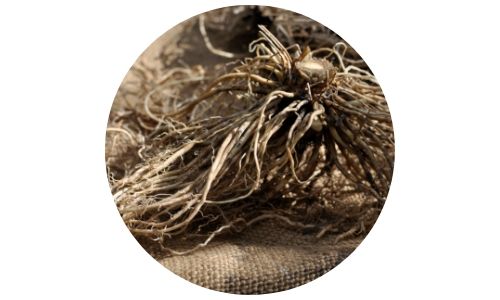
7. Osha Root
Long used by Native Americans for colds, coughs, and sore throat as well as digestive disorders, osha root is an herb that grows in the southwestern U.S. and Rocky Mountains.
While more human studies are needed to determine its effects on lung conditions, research has shown that osha root indeed has anti-inflammatory and antiviral effects that could potentially benefit respiratory problems.(17)
Since osha root is hard to cultivate commercially, you’ll usually find it in sprays, tinctures, and capsules.

More Tips For Lung Health
For all the health benefits that herbal remedies can offer, there are always limits to what they can do. Keep the following tips in mind.
+ Don’t Smoke
It’s such an obvious statement, but it can’t be overstated. As of May 2019, the World Health Organization confirms that tobacco kills up to half of its users, which translates to more than 8 million people each year. (18)
+ Be careful with essential oils
Because essential oils are natural, it’s easy to assume that they’re good for everyone. But this isn’t always the case. For example, peppermint oil is popular thanks to its aromatic menthol compounds that seem to open airways and clear mucus.
However, its side effects are well documented. Peppermint oil can be an irritant when applied to skin or inhaled through the nose. (19, 20)
+ Try breathing exercises
The American Lung Association recommends two types of deep breath exercises that can improve lung health. (21)
One is pursed breathing, which is simply breathing in through your nose and breathing out at least twice as long through your mouth, with pursed lips.
The second is deep breathing, or diaphragmatic breathing. This also requires breathing in through your nose, but focuses on allowing your belly to fill up with air. Once your diaphragm is full, slowly breathe out through your mouth at least two to three times as long as your inhale.
Studies have found that deep breathing, along with some aerobic exercise, improved oxygenation for people with COPD and asthma. (22)
It’s important to note that you should not do these types of deep breathing exercises if you are experiencing shortness of breath. Wait until you are feeling fine, and then begin doing both exercises about 5 to 10 minutes every day.
+ Exercise regularly
From physical health to mental health to emotional health, exercise is key to overall well-being. Studies such as the one mentioned above show that regular exercise can help your lungs function properly and keep you feeling strong in more ways than one.
Breath Of Fresh Air
Unless you’re having problems breathing, chances are you’re not always thinking about the role your lungs play in keeping you well. But if you keep the above herbs and natural remedies in mind, plus follow the practical steps outlined in this guide, your respiratory system will be healthy and happy with every breath you take.

